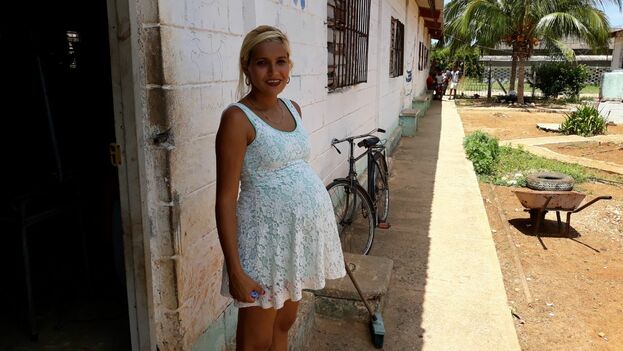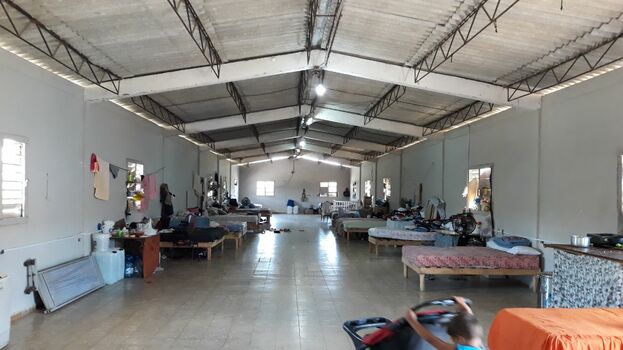
![]() 14ymedio, Luz Escobar, Havana, 11 May 2019 — To get to the shelter you have to walk more than two kilometers under Havana’s inclement sun. No bus route takes you there. There is not a single sign indicating how to get there. The site doesn’t even have a name. Nobody would remember that old warehouse of the Villena Revolution school if it were not for the twenty people who now inhabit it, since a tornado struck Havana last January.
14ymedio, Luz Escobar, Havana, 11 May 2019 — To get to the shelter you have to walk more than two kilometers under Havana’s inclement sun. No bus route takes you there. There is not a single sign indicating how to get there. The site doesn’t even have a name. Nobody would remember that old warehouse of the Villena Revolution school if it were not for the twenty people who now inhabit it, since a tornado struck Havana last January.
Overcrowded, in unhealthy conditions, these victims had no choice but to accept the government’s proposal to live temporarily in this shelter. Many of them are considered “illegal” for having emigrated from the poorest regions of the country to the capital in search of better opportunities for their children.
“This is not life. We’ve been here three months. The conditions are terrible, we have no privacy. We sleep in beds next to each other. We look like pigs,” says Yudelmis Urquiza, one of the displaced who lived for 15 days in a warehouse after she lost her home, until the government brought her to this place.
Urquiza is mixed race, thin, and very loquacious. She seems possessed by a rage that she can not hold back. She wants to explain why she feels insulted at the shelter and can not contain her words. She explodes in descriptions.
The guard of the shelter looks at her out of the corner of his eye. It bothers him that she speaks so freely. He blocks her attempt to give a tour of site but Urquiza passes the camera to a boy who photographs everything those living in the shelter want to denounce.

“The bathrooms are latrines. There is one that is blocked and the shit runs over without stopping. The other latrines are full of eye gnats [the disease-carrier Liohippelates] and other insects. Here all the women have acquired vaginal parasites and no matter how much we complain, nobody pays attention to us,” she says.
She is 29 years old and has two children, aged 11 and nine months. She’s a single mother. Her house on Concha Street, between Infanzón and Pedro Perna, collapsed with the first winds of the tornado. Like half the city, the building was not in good condition. If the tornado had not taken it would have been the rains or a cold front.
On Wednesday the sun was falling vertically on the fiber cement roof tiles of the shelter. The heat was unbearable and a few drops of sweat slid down Urquiza’s face. “Breakfast has not arrived yet,” she yells. The authorities forbid the tornado victims to cook. The food is free, but they are not satisfied with the quality.
“The food is terrible. The Congrí Rice is hard and the picadillo comes with fly poop. The children have had diarrhea and vomiting. One of the pregnant women couldn’t eat for two days because the food was spoiled,” she says.

By this time a group of shelter residents has congregated at the door of the premises. The guard was still stationed at the entrance, undaunted, but the conversation took on the connotation of a formal neighborhood assembly. Everyone wanted to participate.
“The ham comes green. We’ve even found cockroaches in the rice,” said a young man with a thin beard and slicked-down hair. “There are pregnant women here, there are children who need to eat well. They bring food when they feel like it and we have to adapt to their schedules,” he adds.
The drinking water comes from a tank of asbestos cement that is found in the common patio. According to the shelter residents, the health authorities warned them that the water was not chlorinated, but since they are not allowed cooking utensils, they can’t boil it either.
“At first we were afraid, but now we are giving the children that water. We also drink it ourselves. What else can we do?” says another resident of shelter, resigned.
The doctors of the Boyeros polyclinic prescribed the children some tablets of mebendazole [Vermox], a drug for intestinal parasites, but according to the residents, so far they have not been able to find the drug in any pharmacy.

“It is very hard for a mother to see her children living without sanitary conditions. They have had fever and diarrhea. The same doctors from the policlinic said this place was uninhabitable, but we continue living here,” laments one of the residents.
They all say they have written letters to the authorities of the government and the Communist Party asking for a solution to their case, but nobody has answered the letters. Ailena, a 22-year-old pregnant woman about to give birth approached the authorities to ask for help for her “special situation.”
“They told me that this was my a problem. That I had become pregnant and, therefore, I had to solve my own problem,” she says distressed.
“A wind blew off the roof tiles the other day and now when it rains everything gets wet. We spend our lives being careful not to get the mattresses the Church gave us wet,” says the pregnant woman.
The displaced people say that a television report showing victims receiving new houses caused them to start dreaming. “We immediately called Bárbara Agón Fernández, the president of the Municipal Assembly of the People’s Power of Diez de Octubre. She had promised us that after they did a census of us, they would build housing for us,” they say.
However, the official clarified that the aid was only for the “legal” ones. Those who did not have an address in Havana [formally registered with the government] would remain at the shelter indefinitely. They did not even know what they were going to do with them, said Agón, who also urged them to thank the Revolution because “if they were in another country, they would be on the street.”

The shelter residents took out an old propaganda poster of Fidel Castro with his famous concept of Revolution. “Revolution is being treated and treating others as human beings,” said a woman with a slightly mocking tone. The guard, bad-tempered, lost patience and called the police. “Are we imprisoned?” the victims remonstrate. The man does not respond. Minutes later a police patrol with two uniformed officers announced that the interview was over.
“Your journalist’s credential? You have to accompany us to the police station to clarify this situation,” said an officer bluntly.
_____________________
The 14ymedio team is committed to serious journalism that reflects the reality of deep Cuba. Thank you for joining us on this long road. We invite you to continue supporting us, but this time by becoming a member of 14ymedio. Together we can continue to transform journalism in Cuba.
